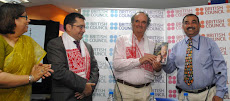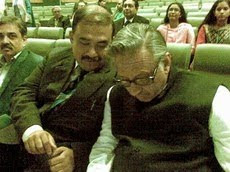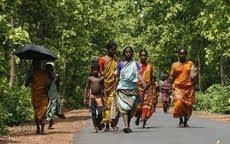 There are hardly any think tank in China that is not linked to some government branch or the other. Independent think tanks dont exist in China. So let us see where the IISS, whose website ran that "splitIndia" article that created such a flutter in India, is placed in the Chinese hierarchy. All available information suggests that it is partof the Second (Intelligence) Department of the PLA General Staff Headquarters. The second department is responsible for collecting military information and it runs the scores of Chinese military attaches at Chinese embassies abroad as well as several clandestine special agents sent to foreign countries to collect military information. It also produces the analysis of information publicly published in foreign countries.
There are hardly any think tank in China that is not linked to some government branch or the other. Independent think tanks dont exist in China. So let us see where the IISS, whose website ran that "splitIndia" article that created such a flutter in India, is placed in the Chinese hierarchy. All available information suggests that it is partof the Second (Intelligence) Department of the PLA General Staff Headquarters. The second department is responsible for collecting military information and it runs the scores of Chinese military attaches at Chinese embassies abroad as well as several clandestine special agents sent to foreign countries to collect military information. It also produces the analysis of information publicly published in foreign countries. The Second Department oversees military human intelligence (HUMINT) collection, widely exploits open source materials, fuses HUMINT, signals intelligence (SIGINT), and imagery intelligence data, and disseminates finished intelligence products to the CMC and other consumers. Preliminary fusion is carried out by the Second Department’s Analysis Bureau which mans the National Watch Center, thefocal point for national-level indications and warning. In-depth analysis is carried out by regional bureaus.
The Second Department oversees military human intelligence (HUMINT) collection, widely exploits open source materials, fuses HUMINT, signals intelligence (SIGINT), and imagery intelligence data, and disseminates finished intelligence products to the CMC and other consumers. Preliminary fusion is carried out by the Second Department’s Analysis Bureau which mans the National Watch Center, thefocal point for national-level indications and warning. In-depth analysis is carried out by regional bureaus.Although traditionally the Second Department of the General Staff Department was responsible for military intelligence, it is beginning to increasingly focus on scientific and technological intelligence in the military field, following the example of Russian agencies instepping up the work of collecting scientific and technological information from the West.
The research institute under the Second Department of the General Staff Headquarters is publicly known as the Institute for International Strategic Studies; its internal classified publication MOVEMENTS OF FOREIGN ARMIES [WAI JUN DONGTAI] is published every 10 days and transmitted to units at the division level. The Second Department of the PLA General Staff is headed by a very aggresive officer, Lt General Xiong Guangkhai. So when a research institute under such an officer talks of breaking up India, there is no way Delhi could wish it away. Let us see the salient points that the controversial article made.
 According to the article, if India today relies on any thing forunity, it is the Hindu religion. The partition of the country wasbased on religion. Stating that today nation states are the main current in the world, it has said that India could only be termed now as a 'Hindu Religious state'. Adding that Hinduism is a decadent religion as it allows caste exploitation and is unhelpful to the country's modernization, it described the Indian government as one in a dilemma with regard to eradication of the caste system as it realizes that the process to do away with castes may shake the foundation of the consciousness of the Indian nation.
According to the article, if India today relies on any thing forunity, it is the Hindu religion. The partition of the country wasbased on religion. Stating that today nation states are the main current in the world, it has said that India could only be termed now as a 'Hindu Religious state'. Adding that Hinduism is a decadent religion as it allows caste exploitation and is unhelpful to the country's modernization, it described the Indian government as one in a dilemma with regard to eradication of the caste system as it realizes that the process to do away with castes may shake the foundation of the consciousness of the Indian nation. The writer has argued that in view of the above, China in its own interest and the progress of whole Asia, should join forces with different nationalities like Assamese, Tamils, and Kashmiris and support the latter in establishing independent nation-states of their own, out of India. In particular, the ULFA in Assam, a territory neighboring China, can be helped by China so that Assam realizes its national independence.
The writer has argued that in view of the above, China in its own interest and the progress of whole Asia, should join forces with different nationalities like Assamese, Tamils, and Kashmiris and support the latter in establishing independent nation-states of their own, out of India. In particular, the ULFA in Assam, a territory neighboring China, can be helped by China so that Assam realizes its national independence.The article has also felt that for Bangladesh, the biggest threat is from India, which wants to develop a great Indian Federation extending from Afghanistan to Myanmar. India is also targeting China with support to Vietnam's efforts to occupy Nansha (Spratly) group of islands in South China Sea. Hence the need for China's consolidation of its alliance with Bangladesh, a country with which the US and Japanare also improving their relations to counter China. It has pointed out that China can give political support to Bangladesh enabling the latter to encourage ethnic Bengalis in India to get rid of Indian control and unite with Bangladesh as one Bengali nation; if the same is not possible, creation of at least another free Bengali nation state as a friendly neighbour of Bangladesh, would be desirable, forthe purpose of weakening India's expansion and threat aimed at forminga 'unified South Asia'.
 The punch line in the article has been that to split India, China canbring into its fold countries like Pakistan, Nepal and Bhutan, support ULFA in attaining its goal for Assam's independence, back aspirations of Indian nationalities like Tamils and Nagas, encourage Bangladesh to give a push to the independence of West Bengal and lastly recover the 90,000 sq km. territory in Southern Tibet.
The punch line in the article has been that to split India, China canbring into its fold countries like Pakistan, Nepal and Bhutan, support ULFA in attaining its goal for Assam's independence, back aspirations of Indian nationalities like Tamils and Nagas, encourage Bangladesh to give a push to the independence of West Bengal and lastly recover the 90,000 sq km. territory in Southern Tibet.Wishing for India`s break-up into 20-30 nation-states like in Europe, the article has concluded by saying that if the consciousness of nationalities in India could be aroused, social reforms in South Asiacan be achieved, the caste system can be eradicated and the region can march along the road of prosperity. The Chinese article in question has outraged readers in India after it was summarised by a well known China expert D S Rajan.
The External Affairs Ministry has also protested but without much impact. It has generally been seen that China is speaking in two voices - its diplomatic interlocutors have always shown understanding during their dealings with their Indian counterparts, but its selected media under its military set up is pouring venom on India in their reporting.
There is no doubt that the IISS article was part of China's psychological war against India. For some time, China has been very upset with India's growing strategic relationship with the US. I would say this is China's way of telling India not to go too far with the US.
We saw this kind of warnings appearing in the select Chinese media for about a year or two, warning India to "stop backing the Tibetan counter-revolutionaries" or face the consequences. Then came thet hunderous punch of 1962.
So if you see a smoke rise from China, be sure the fire is not toolong in coming.







